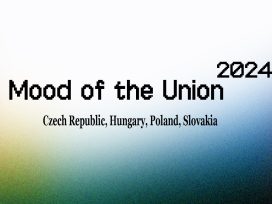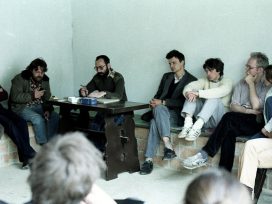Ferenc Laczó
Assistant Professor with tenure in European History at Maastricht University, co-managing editor of the Review of Democracy (CEU Democracy Institute), and currently István Deák Visiting Assistant Professor at the Harriman Institute, Columbia University. His recent publications include, as co-editor with Bálint Varga and András Vadas, Magyarország globális története (A Global History of Hungary) in two volumes (2022-23).
Articles

Writing a trade book about the ‘anti-gender ideology movement’, feminist scholar Judith Butler takes on anti-intellectualism in form and content. Fear of gender diversity is confessional, they write: declaring cisgender rights under threat revokes those of all others. In contrast, gender studies opens up potential for the material and the social to be seen as one.

Prefiguring Europe’s future
Czech Republic, Hungary, Poland, Slovakia
Since the war in Ukraine, the Visegrád Four group no longer articulates a common voice in the EU. Even the illiberal alliance between Hungary and Poland has come to an end. Yet in various ways, the region still demonstrates to Europe the consequences of the loss of the political centre.

Now you see me, now you don’t
Yaroslav Hrytsak on the global history of Ukraine
What makes Ukraine a geopolitically crucial borderland and why has the Ukrainian question become acute at the most critical turns in global history? Historian Yaroslav Hrytsak talks to Review of Democracy about his new book ‘Ukraine: The Forging of a Nation’.

How democracies transform, fast and slow
A response to John Keane
For all its acuity, John Keane’s theory of democide risks confusing democratic degradation with a transformation of the political debate. Not only that, it fails to account for the radicalization of authoritarian systems once democracy has been killed.

Rhapsody of emancipation
On the interventions of Gáspár Miklós Tamás
An anarchist philosopher turned right-leaning libertarian and anti-capitalist critic of the illiberal order, Gáspár Miklós Tamás (1948–2023) embodied what east European thinkers have tended to be best at: making paradoxes intelligible.

Arbitrary lines
The idea of Europe – and its consequences
The myth of European exceptionalism no longer holds: the continent’s boundaries are arbitrary, its heritage mixed and controversial, and unfit for a unified identity to hold it together. If we give up the commonplaces that have proven insufficient, what can then define and unify this peninsula of peninsulas? True democratic dissent, Ferenc Laczó argues.

Wasn’t the East-West divide supposed to go away?
Discussing ‘The Legacy of division: Europe after 1989’ with the curators
Was it foolish to expect Europe to unite after the Iron Curtain fell? What kept the wounds from healing? Talking the post-Communist heritage in Gagarin, the Eurozine podcast.

The legacy of division: Editorial
East and West after 1989
When the Cold War came to a sudden end thirty years ago, the two halves of Europe declared in unison their intention to overcome the legacy of the division. Today, the hopes and ambitions of those heady days can be viewed as unrealistic at best. But is talk of a new East–West divide justified?

Mapping the road to unfreedom
Timothy Snyder’s ‘The Road to Unfreedom’ critiqued and explored
In ‘The Road to Unfreedom’, historian Timothy Snyder traces the intellectual roots of modern authoritarianism in Russia and how its influence has spread, not least in the West. In the following exchange, three east-central European scholars, brought together by ‘Razpotja’, critique Snyder’s new book – and Snyder responds.

Populism in power in Hungary
Consolidation and ongoing radicalization
Viktor Orbán’s ruling Fidesz party looks well placed to sweep a third successive general election on 8 April. Why is its brand of right-wing populism – famously dubbed ‘illiberal democracy’ by Orbán himself – so successful in Hungary? Ferenc Laczó investigates.

The Europeanization of Holocaust remembrance
How far has it gone, and how far can it go?
This year’s International Holocaust Remembrance Day (27 January) was marked by a row over a new Polish law that would criminalize any suggestion that Poland was responsible for Nazi atrocities. In a prescient speech delivered just days earlier, historian Ferenc Laczó observes that the Europeanization of Holocaust remembrance still has a long way to go.



